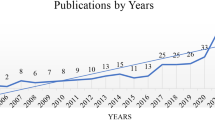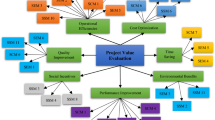Abstract
Construction contractors do not have a clear understanding of sustainability, especially in developing countries. However, they welcome higher productivity as a determinant parameter in scheduling and financial success of construction project. Therefore, construction productivity improvement can be employed as an incentive to persuade contractors for implementing sustainability mechanisms in construction project. On the other hand, sustainability is a comprehensive concept which requires system thinking for implementation. Therefore, this study developed a qualitative System Dynamics model to contribute to measuring sustainability performance of construction project, considering contractors’ tendency to productivity. Sustainability performance is examined in three aspects of economic, social and environmental by introducing different subsystems and feedback loops. These loops formed based on experts’ opinions about causal links among the factors affecting construction sustainability and productivity. The findings provide a proper basis for both practitioners and researchers through illustrating the cohesion between productivity and sustainability.



Similar content being viewed by others
References
Hill RC, Bowen Paul A (1997) Sustainable construction: principles and a framework for attainment. Constr Manag Econ 15(3):223–239
Chaharbaghi K, Willis R (1999) The study and practice of sustainable development. Eng Manag J 9(1):41–48
Parkin S (2000) Context and drivers for operationalizing sustainable development. In: Proceedings of the ICE—Civil Engineering 138 (6). Thomas Telford, pp 9–15
Shen LY, Wu YZ, Chan EHW, Hao JL (2005) Application of system dynamics for assessment of sustainable performance of construction projects. J Zhejiang Univ Sci A 6(4):339–349
Chong WK, Kumar S, Haas CT, Beheiry SM, Coplen L, Oey M (2009) Understanding and interpreting baseline perceptions of sustainability in construction among civil engineers in the United States. J Manag Eng 25(3):143–154
Kibert CJ (1994) Establishing principles and A model for sustainable construction. In: Proceedings of the first international conference on sustainable construction, Tampa, Florida, USA, pp 3–12
Miyatake Y (1996) Technology development and sustainable construction. J Manag Eng 12(4):23–27
Ofori G (1998) Sustainable construction: principles and a framework for attainment—comment. Constr Manag Econ 16(2):141–145
Pulaski M et al (2004) Field guide for sustainable construction. United States Dept. of Defense and the Partnership for Achieving Construction Excellence at the Pennsylvania State University
Chen Y, Okudan GE, Riley DR (2010) Sustainable performance criteria for construction method selection in concrete buildings. Autom Constr 19(2):235–244
Dadpour M, Shakeri E (2016) Improving strategies of the private sector participation in water sector projects: a case study in Ministry of Energy (Iran). Int J Civil Eng 14(1):61–73. doi:10.1007/s40999-016-0004-7
Matar MM, Georgy ME, Ibrahim ME (2008) Sustainable construction management: introduction of the operational context space (OCS). Constr Manag Econ 26(3):261–275
Yapicioglu B, Mogbo ON, Yitmen I (2017) Innovative strategies for transport policies in infrastructure development: Nigerian stakeholders’ perspective. Int J Civil Eng. doi:10.1007/s40999-017-0172-0
Shen L, Wu Y, Zhang X (2011) Key assessment indicators for the sustainability of infrastructure projects. J Constr Eng Manag 137(6):441–451
El-Rayes K, Moselhi O (1999) Optimizing resource utilization for repetitive construction projects. J Constr Eng Manag 127(1):18–27
Oral EL, Oral M, Andaç M (2016) Construction crew productivity prediction: application of two novel methods. Int J Civil Eng 14(3):181–186. doi:10.1007/s40999-016-0009-2
Thomas Ng S, Skitmore RM, Lam KC, Poon AWC (2004) Demotivating factors influencing the productivity of civil engineering projects. Int J Project Manage 22(2):139–146
Rivas RA, Borcherding JD, González V, Alarcón LF (2011) Analysis of factors influencing productivity using craftsmen questionnaires: case study in a chilean construction company. J Constr Eng Manag 137(4):312–320
Katsanis CJ (2003) System dynamics modeling for a decision support system for assessing construction productivity. In: 5th construction specialty conference of the Canadian Society for Civil Engineering, Moncton, Nouveau-Brunswick, Canada, pp COG-310-1–10
Jaillon L, Poon CS (2008) Sustainable construction aspects of using prefabrication in dense urban environment: a Hong Kong case study. Constr Manag Econ 26(9):953–966
Alnaser NW, Flanagan R, Alnaser WE (2008) Model for calculating the sustainable building index (SBI) in the kingdom of Bahrain. Energy Build 40(11):2037–2043
Beheiry S, Chong W, Haas C (2006) Examining the business impact of owner commitment to sustainability. J Constr Eng Manag 132(4):384–392
Häkkinen T (2007) Assessment of indicators for sustainable urban construction. Civil Eng Environ Syst 24(4):247–259
Ho Y, Wang S (2005) System dynamics model for the sustainable development of science city. In: The 23rd international conference on the system dynamics society, Boston, USA. System Dynamics Society, Albany, New York, United States of America
Manoliadis O, Tsolas I, Nakou A (2006) Sustainable construction and drivers of change in Greece: a Delphi study. Constr Manag Econ 24(2):113–120
Sage AP (1998) Risk management for sustainable development. In: 1998 IEEE international conference on systems, man and cybernetics, San Diego, USA. IEEE, Piscataway, USA, pp 4815–4819
Parkin S (2000) Sustainable development: the concept and the practical challenge. In: Proceedings of the ICE—civil engineering 138 (6). Thomas Telford, pp 3–8
Zainul Abidin N (2010) Investigating the awareness and application of sustainable construction concept by Malaysian developers. Habitat Int 34(4):421–426
Du Plessis C (2007) A strategic framework for sustainable construction in developing countries. Constr Manag Econ 25(1):67–76
Park H, Thomas SR, Tucker RL (2005) Benchmarking of construction productivity. J Constr Eng Manag 137(7):772–778
Dai J, Goodrum PM, Maloney WF, Srinivasan C (2009) Latent structures of the factors affecting construction labor productivity. J Constr Eng Manag 135(5):397–406
Schianetz K, Kavanagh L (2008) Sustainability indicators for tourism destinations: a complex adaptive systems approach using systemic indicator systems. J Sustain Tour 16(6):601
Rajendran S, Gambatese JA (2009) Development and initial validation of sustainable construction safety and health rating system. J Constr Eng Manag 135(10):1067–1075
Chen Z, Li H, Ross A, Khalfan M, Kong C (2012) Knowledge-driven ANP approach to vendors evaluation for sustainable construction. J Constr Eng Manag 134(12):928–941
Yunus R, Yang J, Too E (2011) Sustainability factors in industrialised building system. In: World sustainable building conference (SB11), Helsinki, Finland
Bourdeau L (1999) Sustainable development and the future of construction: a comparison of visions from various countries. Build Res Inf 27(6):354–366
Hiete M, Kühlen A, Schultmann F (2011) Analysing the interdependencies between the criteria of sustainable building rating systems. Constr Manag Econ 29(4):323–328
Huang RY, Hsu WT (2011) Framework development for state-level appraisal indicators of sustainable construction. Civil Eng Environ Syst 28(2):143–164
Ross N, Bowen Paul Anthony, Lincoln D (2010) Sustainable housing for low-income communities: lessons for South Africa in local and other developing world cases. Constr Manag Econ 28(5):433–449
Tae S, Shin S (2009) Current work and future trends for sustainable buildings in South Korea. Renew Sustain Energy Rev 13(8):1910–1921
Kazaz A, Manisali E, Ulubeyli S (2008) Effect of basic motivational factors on construction workforce productivity in Turkey. J Civil Eng Manag 14(2):95–106
Nepal MP, Park M, Son B (2006) Effects of schedule pressure on construction performance. J Constr Eng Manag 132(2):182–188
Hanna AS, Taylor CS, Sullivan KT (2005) Impact of extended overtime on construction labor productivity. J Civil Eng Manag 131(6):734–739
Alinaitwe HM, Mwakali JA, Hansson B (2007) Factors affecting the productivity of building craftsmen: studies of Uganda. J Civil Eng Manag 13(3):169–176
Beheiry S, Chong W, Haas C (2006) Examining the business impact of owner commitment to sustainability. J Constr Eng Manag 132(4):384–392
Sterman JD (2000) Business dynamics: systems thinking and modeling for a complex world. McGraw-Hill, Boston
Forrester JW, Senge PM (1980) Tests for building confidence in system dynamics models. Syst Dyn 14(1):209–228
Park M, Nepal MP, Dulaimi MF (2004) Dynamic modeling for construction innovation. J Manag Eng 20(10):170–177
Author information
Authors and Affiliations
Corresponding author
Rights and permissions
About this article
Cite this article
Dabirian, S., Khanzadi, M. & Taheriattar, R. Qualitative Modeling of Sustainability Performance in Construction Projects Considering Productivity Approach. Int J Civ Eng 15, 1143–1158 (2017). https://doi.org/10.1007/s40999-017-0241-4
Received:
Revised:
Accepted:
Published:
Issue Date:
DOI: https://doi.org/10.1007/s40999-017-0241-4







